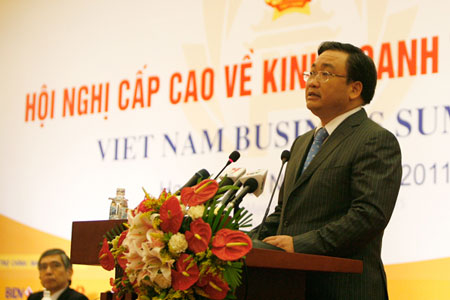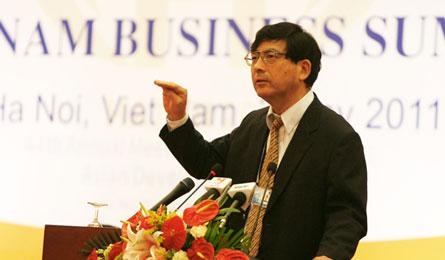ADB: Vietnam must avoid “average-income trap”
 |
| Deputy Prime Minister Hoang Trung Hai |
 |
| Prof. Kenichi Ohno |
At the Vietnam Business Summit, held in Hanoi on May 3, ADB Chairman Haruhiko Kuroda said that Vietnam should pay more attention to improving the quality of its human resources, one of the most important factors that could help the country avoid this “trap”.
What’s an average-income trap?
Prof. Kenichi Ohno, from Japan Policy Research Institute University of San Francisco Centre for the Pacific Rim, explained that such a situation occurs when the economy of a country reaches a threshold which it cannot pass because of a reliance on natural resources and other limited economic advantages.
He noted that growth based on FDI, ODA, natural resources, large investment projects, securities and realty is not sustainable for the long term, which must rely on value created by people.
Huge amounts of capital still needed for development
Vietnam is estimated to need around $300 billion for development between 2010 and 2015, according to Deputy Prime Minister Hoang Trung Hai.
The country will give priority to improving the business environment, developing labour, science and technology markets, he noted.
Vietnam’s economic growth has averaged 7.26 per cent year over the past ten years. The country received ODA pledges of nearly $8 billion last year, a record high, he added.
He noted that the nation is facing great challenges, including unsustainable economic growth, lack of a skilled workforce, and too high of an income gap.
Trap poses real danger
According to Haruhiko Kuroda, Vietnam must make greater efforts to avoid the “trap” scenario.
As part of the attempt, the Government should increase its support of small and medium-sized enterprises (SMEs). These firms have been playing an important role in the national economy, contributing around 47 per cent to the country’s GDP.
He praised Vietnam’s efforts which led to a reduction of the poverty rate from 58 per cent to 10 per cent during the 20-year renewal, adding that the nation has great potential for further development in the medium and long terms.
Vietnam’s economic growth in the past has been fueled by an opening of trade policies, along with a large flow of capital from ODA, FDI, overseas remittances, and the securities and realty markets, said Kenichi Ohno. He pointed out that this growth is not based on productivity.
According to Ohno, in order to attain sustainable growth, Vietnam should make policies to encourage improve education and innovation.
What the stars mean:
★ Poor ★ ★ Promising ★★★ Good ★★★★ Very good ★★★★★ Exceptional
 Tag:
Tag:
Related Contents
Latest News
More News
- Hermes joins Long Thanh cargo terminal development (February 04, 2026 | 15:59)
- SCG enhances production and distribution in Vietnam (February 04, 2026 | 08:00)
- UNIVACCO strengthens Asia expansion with Vietnam facility (February 03, 2026 | 08:00)
- Cai Mep Ha Port project wins approval with $1.95bn investment (February 02, 2026 | 16:17)
- Repositioning Vietnam in Asia’s manufacturing race (February 02, 2026 | 16:00)
- Manufacturing growth remains solid in early 2026 (February 02, 2026 | 15:28)
- Navigating venture capital trends across the continent (February 02, 2026 | 14:00)
- Motivations to achieve high growth (February 02, 2026 | 11:00)
- Capacity and regulations among British areas of expertise in IFCs (February 02, 2026 | 09:09)
- Transition underway in German investment across Vietnam (February 02, 2026 | 08:00)




















 Mobile Version
Mobile Version